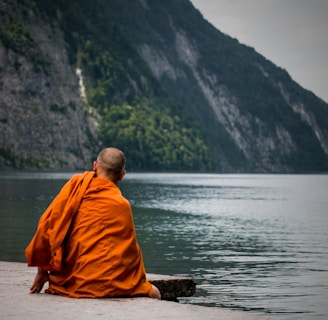Monk Mode: What It Is, Dangers, And More
Discover what monk mode is, its dangers, and more about it.
ARTICLES


Monk Mode
Monk mode is a trend on social media that depicts a way of life. This way of life is only a small period (a few months up to a year) where you cut yourself from social life and solely focus on your goals.
Monk mode is about living like a monk, but instead of focusing on realizing god or meditating, you focus on your goals such as entrepreneurship, sports performance, maybe an upcoming competition or exam, etc.
To get into monk mode, you simply have to disconnect from social media and events and spend the vast majority of your day on a specific goal. It could be improving yourself massively in a certain time span, making X amount of money, getting X amount of followers on Youtube by the end of the month, etc.
One key thing during a monk mode period is to simply erase distractions, this is why the removal from social interactions is 1) recommended by monk mode enthusiasts and 2) dangerous and ridiculous.
Yes, even tho this article might appear to be in favor of monk mode at first, I’m actually against it by ALL MEANS. Monk mode is just a way for introverts to feel better and reassured by the fact that they have no friends or that they are hidden from the social world.
You see, when being introverted (not having or wanting any social interactions) is cherished by a vast community (the monk mode community in this case), it’s really easy for introverts to feel good about their shitty life. They feel good about not going out, they feel reassured and great in the fact that they’re not getting out of their comfort zone by any means.
It’s a way to socially validate unsocial people. Here you got it, a paradox. The second paradox is that monk mode is supposed to be a period of intense growth, both physical and mental as well as spiritual, but in 100% of cases, it’s the contrary.
You see, if you actually got out into the social world, you would learn MUCH MORE about human nature and life in general than you would if you stayed like a low-status introvert in your home.
Real growth happens in real life, and hiding behind a self-improvement mirage of introvert-lifestyle is only a way of lying to yourself about whether or not you’re growing as a person. Sure, if you meditate for 1 hour every day in monk mode and you’re making progress on your business and you’re making more money than ever and blah and blah, it might seem beneficial for these specific parts of your life.
Also, just understand that monk mode is not fundamentally bad, and sometimes cutting yourself from the social life can help you discover more about yourself, IF DONE PROPRELY, and with the intent of going back into the social world. Going on monk mode for a year and disconnecting totally from the social world, is not it.
However, you might have actually made more progress in all domains of life if you got out into the social world, made meaningful connections, and therefore learned more about yourself and the world and people and human nature and your purpose and your future job and your life etc, than if you just stayed at home reading a book on social relationships for hours a day instead of actually going out into the world and engaging into social events.
I’m not asking you to be a degenerate party boy or to waste all of your time on social events, but everything needs balance. The yin and the yang. You need to be engaging in intense periods of work, but still having a period of relaxation, which includes but is not defined by, social relationships.
This whole monk-mode trend stems from the self-improvement autist movement. The self-improvement autist movement is a sort of joke or meme on the internet, but it is real.
You see, a lot of men and women, when they get into self-improvement (especially younger people), they tend to become “autistic”. They hide so much from social relationships and normal interactions of everyday life by hiding behind the monk mode trend or by "grinding" that they end up being this sort of dumb, weird, socially awkward self-improvement fanatic.
You know, the kind of guy who goes out to run ONLY when it’s raining, so he looks cool. Or the kind of guy who goes out and does push-ups in the street at 1 AM, screaming David Goggins's mantra “They don’t know me, son!”.
Or even, the guy who is so focused on watching self-improvement videos, that he’s actually worsening himself by not taking any action whilst wasting precious time. It’s that guy who looks awkward and who seeks validation from other people through self-improvement. It’s that gym-bro who loves himself a little bit too much.
I’m not going to continue but I think you caught on to what is a self-improvement autist. It’s that awkward, non-social, weird mindset guy who’s not really living in real life but in his own self-improvement self-protected bubble.
And, monk mode often leads to these types of situations. The retreat from social life simply limits the progress you make in life in monk mode, no matter if you read 30 minutes or 8 hours a day. Reading a book on social relationships will never make you as social as the guy who goes out into the world and tries to be socially active.
Monk mode is basically the excuse for introverted people and self-improvement autists to stay in their small, introverted, self-improvement autistic bubble of self-protected importance.
Now sure, if you still indulge in social interactions but spend more time on your projects, or if you cut yourself from social life to find more about yourself and work hard on your projects with the intent of going back into the social world soon, this might be a “positive version” of monk mode, even tho I wouldn’t call it “monk mode” but recognizing it simply as a period of your life where you prioritize your projects.
But remember that overall, balance is key.
The modification I would bring to monk-mode
If I had to make modifications to monk mode, I would put more emphasis on relaxing and more emphasis on social relationships. Most people in monk mode focus on working: working on their business 8-10 hours a day, going to the gym twice a day, reading 4 hours a day, etc.
What I personally think we should focus on more is also relaxation (walking in nature, religion, a massage, sitting and observing nature, practicing NSDR) and social relationships (going to the gym with friends, going out with friends, meeting new people, cold approaching girls if you’re single, spending time with your woman or kids, etc).
If you close in onto yourself, you’re basically stopping the world from receiving a part of your true gifts, you’re essentially retreating from social life and the world, from the challenges it brings.
This is why I don’t like “monk mode”, and I prefer periods where you prioritize your work, or your wisdom, or your spiritual awakening, etc. It’s much better to have periods of intense work and still have positive social relationships rather than focusing intensely on one thing at the expense of other crucial activities such as, in this case, social relationships and social connections, or even relaxation.
Because yes, balance is key in life, especially if you’re pushing yourself to limits every day. We seldom want to admit this in our modern society but playtime is important too, and not in the form of TV or video games or junk food, but in the form of relaxation in nature, sports with friends or your kids or your woman, time spent realizing god or watching the sky or observing nature, or simply thinking and being aware of our thoughts or feelings.
Also, it’s important to assess the sustainability of monk-mode. You might be able to make progress on your business by retreating from social relationships and using that time instead to work on your projects but you might not be 1) as productive because you need the recreation and 2) you will not make as much progress in life.
Now of course, it varies from person to person, but generally, for most people, we want fulfilling social relationships because they’re key to living a great, fulfilling life.
All of this is to say that it’s much more sustainable, and it’s a much more sustainable approach to self-improvement if you simply work on yourself whilst still relaxing and whilst still having social relationships, and you’ll probably make more progress anyway.
Now, if you need to focus on your business or your athleticism or your realization of god, then go out there and focus on this and prioritize it at the expense of other activities, maybe even cut yourself from social events for a short time, but always stay with balance and include some sort of social activity at one point or another.
Also, having balance doesn’t mean playing video games, watching TV for hours, eating junk food, or smoking pot. I’m not saying to waste your time and be unproductive, I’m not saying to fill your brain with garbage, I’m not saying to be a degenerate or a weak human being, I’m telling you to have balance by relaxing through NATURAL, healthy means, such as watching the birds in the sky for example, or going a day to the beach, or going to a nice restaurant with friends.
Just don’t overthink it. Practice improving yourself, but still spend QUALITY time that doesn’t make you worse with good people, going to nice places that are worth your time, such as nice restaurants for example.
CONCLUSION
I hope this article was of help to you. Remember that balance is key in life, especially in self-improvement.
If you want to become the best version you can be of yourself, then learn to balance your hard work with relaxation and nice time spent with people which will give you human and social experiences which will help you understand human nature and the world better, therefore serving your growth in the vast majority of cases.
As always, thank you for reading, and I’ll see you next time.
By the way, are you interested in losing weight? Well, I got what you need! Here is the weight-loss course I made! It's an effective and no-nonsense course to long-lasting sustainable weight loss, used by a 16-year-old to lose weight, change his life forever, and keep the weight off!
On top of that, not only is it cheaper than most courses and it provides EVERYTHING YOU NEED TO KNOW ABOUT WEIGHT-LOSS, it also has 12 FREE BONUSES, such as habit trackers, workout plans, guides to losing weight on vacations, bulking up after weight-loss to gain muscle or even optimizing your testosterone. For FREE.
If you're interested, click on the button below.


